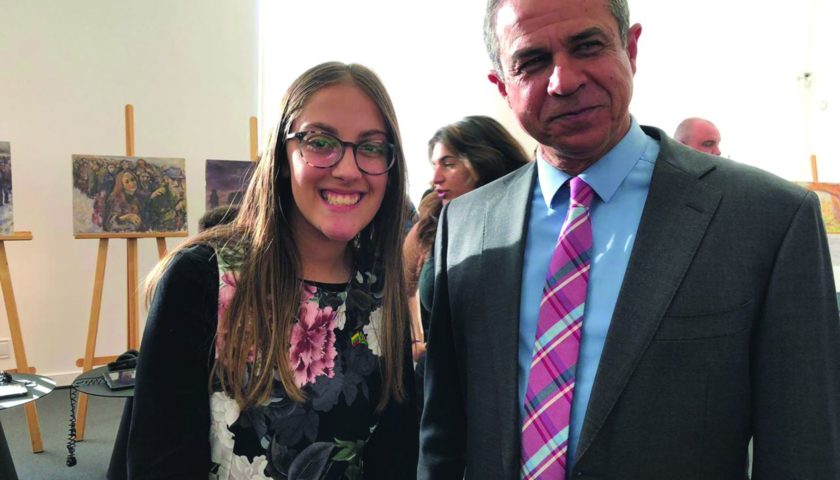Doing what he was created for
By Chandrea Serebro
“My dear husband, Tuvia, who passed away just over a year ago, was rather reserved, introverted, and quiet. He had a beautiful sense of humour, a wit that came from his genius. He loved a good laugh when it was a good joke,” explains Chana (nee Pesskin), the wife of Rabbi Tuvia Sifris, ztz”l, as she speaks to me, lovingly remembering her husband and the quiet impact he made on the lives of each of their children, and herself.
At the memorial service in Rabbi Tuvia’s honour at Kollel Yad Shaul, Rabbi Boruch Dov Grossnass explained, “Reb Tuvi touched a lot of mosdos [institutions] whose influence ran through various sectors of the South African Jewish community.” Among the many places and people he touched “he learned at the Kollel of Yad Shaul; he davened Shabbos and gave shiurium at Adas Yeshurun; he learned at Yeshivah Gedolah under Rabbi Azriel Goldfein and got semicha there; he taught for many years at Hirsch Lyons; he learned with the Chief Rabbi and they were at yeshiva together; and he had chavrusas with many people.”
Tuvia lived his life holding Hashem’s hand. He lived his life knowing that we cannot be frivolous or over exuberant because of our galus (exile), so he reigned himself in. “He would tell this to the girls, who wanted to be ‘freer’ in their dress around the house. And he would say that tznius is for your own neshama.” He had a constant awareness of living life asking: ‘What is my avoda (work)?’ “Day in and day out, everything he did was done l’sheim shamayim (for the sake of Heaven). He set high standards for himself, but he was very accepting of other people and especially their shortcomings.”
He was constantly thinking. His attention to detail and to every nuance of halachah was spot on. As Rabbi Grossnass expressed at the memorial, “Reb Tuvia was recognised as a person who was a reservoir of Torah knowledge. He was able to find all sorts of not well-trodden sources; he would be able to spill it out. And this was a person who made nothing of himself. Because he gave his all. Literally his all. Without making a fuss of it. His memory was phenomenal, his yedias Hatorah (knowledge of Torah) was phenomenal, but more than anything was his yegiah haTorah, his toil, his hasmadah, his diligence.”
“Tuvia possessed a quiet depth and breadth of Torah which very few people in this world have,” says Chana, – “and he had the gift of having had it as a very young man because of the full-time learning that he had always busied himself with, supported at every moment by his father, who played a firm role in his life until he passed away in 2012.” Tuvia and his father, Jackie, after whom their son, Yaakov aka Kovi, is named, were the closest of friends. “I remember asking him on one of our dates: if you had a problem, who would you ask for guidance? I was expecting him to answer this rabbi or that. But his answer was always: ‘My brother, Bradley, and my dad.’ That is how it always was.” He called his father daddy till the last, always emphasising the mitzvah of kibud av va’eim (honouring one’s father and mother).
Tuvia’s father, Zeida to the children, was brought up in a Jewish home with great pride and a strong Jewish identity, but without a strong Jewish education. Tuvia, in turn, was brought up in a home with great Jewish pride, but along with some of the knowledge to back it up as well, having gone to a Jewish day school. Tuvia’s mother, Rosalind, Gaga to the children, gave fully of herself to facilitate the changes and transformation in her home that Tuvia brought about, having tremendous pride in her son and the man who he became.
The Sifris family made Aliyah when Tuvia was ten years old, and lived in Israel for two years. “When they arrived at the Absorption Centre in the heat of summer, Tuvia and his siblings asked: Where’s the pool? It was a massive culture shock for them, coming from South Africa.”
But Tuvia came into this world with an “intense innate sensitivity” to him. “From the youngest age he would never tittle tale on his sister or brother. His friends were carefully chosen. He did not speak loshen harah. His Bobba and Zeida, who were from Lithuania and directly affected by the Holocaust, had instilled in him an innate sense of what is right and wrong. Once, on a soccer tour, before he was even bar mitzvah, the hotel restaurant served chazer (pork). Tuvia refused to eat there.” This sensitivity and love of Torah and learning ran deep, and the currents of generations that ran before infused his parents and Tuvia and his siblings as well.
When Tuvia finished high school at 18, he enrolled full-time at the Yeshivah Gedolah of Johannesburg, learning Torah under the Rosh Yeshivah, Rabbi Azriel Chaim Goldfein, ztz”l.” Chana’s eyes shine as she recounts Tuvia’s deep love and respect for the Torah and for Torah learning. Their oldest daughter, Nechami, now 15, loved the sound of his continuous learning in the house, enjoying the humming that she now associates with it, and the memory of “cuddling into his ‘warm heart’”.
And Chana loved the learning too, even when it took Tuvia away from home. “I was here for hours and hours without him. He was busy learning, davening, teaching. Yes, the sound of his learning permeated the house, but I knew that, if I needed him, he would be there for us. He was never too busy to assist with kodesh homework, even if it took long, and he always expected the child to do it slowly, patiently, and methodically so that the child ‘owned’ her own work, without thought of how it was taking up his own time. I miss that.”
He was always totally engrossed in his Torah learning, which was foreign to Chana, even though it was what she searched for high and low. Chana met Tuvia in South Africa, which came as a surprise because “I never thought I would find a South African man of the calibre of what I wanted”. Rebbetzin Goldfein set the two up, having told Chana that he was everything that she had described. “But love? That she couldn’t promise. That would be up to us. A gift from Hashem.”
“Tuvia understood people. He was a very brilliant teacher. There are stories about how he stood up for downtrodden students, how one act by him formed a student’s whole sense of yiddishkeit thereafter. He would tell me stories of the boys from school, but he never ever mentioned a boy’s name. He was careful and measured. ‘Hashem brings the answer in time,’ he would always say, and he taught me patience to allow the process to happen. He was always the anchor, the voice of reason, steering the ship back on to course. He had such a deep love for his children.” He also had a deep love of nature and was fascinated by it, especially enjoying trees, birds, and game viewing. On occasion, he would use Rabbi Gifter’s words to describe how one of the powerful ways we achieve emunah is seeing Hashem’s works and creations in this world.
Tzippy, now seven, always loved Daddy’s hugs, and Daddy reading to her, especially parsha and middos stories. Rachel, now ten, loved his lap at times during a Shabbos seuda when he sang the zemiros that he loved; he always got the kids to participate gladly. “We still sing those zemiros the way he did. We feel close to him when we do it. Nechami told me he was too good for this world. She would walk with him quietly at a deserted time on the beach, comfortable in their quiet togetherness. Being the eldest, she had the best of his years.”
It was one of the children, three years old at the time, who discovered the melanoma underneath his feet one erev Yom Kippur while resting together, which he recovered from, but which years later manifested on erev Sukkos as a malignancy on his spleen and in his pelvis. “I was just sobbing. He told me there is no space for tears. And Yom Tov in the sukkah was special because of his unstoppable z’rizus (zeal). He reassured me and everyone: with Hashem’s help, we would get through this.”
“Leah always went to say good night to daddy with a kiss on his forehead. When he was in ICU and his coma was deepening, we didn’t know when he was awake. One night, she bent down to kiss his forehead and said the usual ‘good night daddy’, and he responded ‘good night Leah’. She and I were both shocked with tears in our eyes that daddy had spoken from the depths of his coma.” For Chana, it was an incredible but painful lesson to see him losing weight, deteriorating, in pain – but always patient with a kind word.
“His caretakers called him The Rabbi. When he was immobile, he still insisted on going to every minyan, and every seder at the Kollel. He came home late, exhausted, but grateful for another day to serve Hashem.” As Rabbi Grossnass described, “We all witnessed, all the time, but especially in the last six to eight months when he could not walk anymore. But he came to the Kollel, he came to seder, he came to shiurium, he came to davening, on a daily basis, hardly missing, except if he had to go to a Doctor’s appointment and then he would tell me beforehand” so that they would know he wouldn’t be there.
Rabbi Tuvia went on for over two months, with mass prayer rallies and Tehillim in his zchus (merit). At the memorial, Rabbi Grossnass told over how “a couple of days before he was niftar [passed away], in his hospital room, the last time he had his eyes open and he was awake, he said a few words. He muttered an apology that he [was] not attending [learning] seder. In his moment of clarity he felt that he should be somewhere else – in the ohel [tent], learning Torah. He learned Torah constantly. And when he wasn’t learning Torah he was thinking it. And he didn’t expect any rewards, any accolades, anything special. This is what he was created for.”
“He wasn’t a man of his generation,” says Chana, he was born for a number of years in order to fulfil his task, and that is all. And his Torah learning was his all. I’m grateful that the kids have the legacy of their father. They are proud of him and what he achieved, how well respected he was by all.” Chana told her youngest child Yaakov that his daddy is learning Torah day and night with Hashem now. “‘Doesn’t he get tired?’ he asked. I said: ‘The neshama never gets tired; only the body does.’ Kovi liked that. I’m sure Tuvia is loving it too.”
Special thank you to Anthony Freeman of Freeman Productions (www.freemanproductions.co.za) for providing us access to video of the hespedim (eulogies) delivered for Rabbi Sifris at the memorial that took place at the Kollel Yad Shaul and from which Rabbi Grossnass’s comments above were excerpted.




